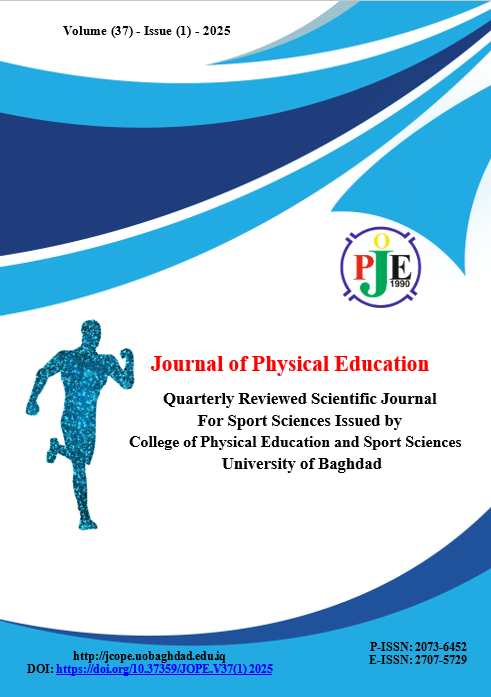Design of composite attention test according to optimal accuracy zones for crushing players (16-18 years) in volleyball
DOI:
https://doi.org/10.37359/JOPE.V37(1)2025.2178الكلمات المفتاحية:
Design and build test، composite attention، optimal accuracy zones، for crushing players (16-18 years)، volleyballالملخص
The research aims to build and codify the composite attention test according to the optimal accuracy areas for the players of the overwhelming beating (16-18 years) in volleyball and find levels and standard grades for them, where the researchers used the descriptive approach in the survey method to fit with the research problem and represented the research community with middle school students in a secondary school in Karrada School for Distinguished (Directorate of Education Rusafa II), which numbered (93) students from the regular students in attendance and the research sample was represented by (30) students and were identified In a deliberate way, the sample of legalization was represented by (30) students, where the researchers concluded that the composite attention test according to the optimal accuracy areas for the players of the overwhelming beating (16-18 years) in volleyball achieved the purpose for which it was designed and the researchers reached the development of grades and standard levels of the composite attention test according to the optimal accuracy areas for the players of the overwhelming beating (16-18 years) in volleyball and the researchers recommended the adoption of the composite attention test according to the optimal accuracy areas for the players Overwhelming beating (16-18 years) in volleyball and prepared by researchers.
المراجع
Hoffman. (2012). Theories and general methodology of training for sports competition, p. 66. Leiberg: German University of Applied Sciences.
Abu Ela Ahmed Abdel Fattah. (2012). Contemporary Sports Training, p. 233. Cairo: Dar Al-Fikr Al-Arabi.
Ajmad Abdul Muttalib Muhammad Hassan. (2018). Iraq Babylon. Journal of Physical Education Sciences, pp. 190-174.
Mr. Mohammed Abu Hashim Hassan. (2006). Psychometric properties of measurement tools in educational and psychological research, p. 2. Riyadh: King Saud University, College of Education.
Bassem Odeh Ali and Mohammed Walid Shehab. (2020). Ethnicities Anbar. Anbar University Journal of Physical Sciences and Sports, pp. 157-132.
Bassam Ali and Saad Fadel Abdel Qader. (2011). Iraq Baghdad. Faculty of Basic Education Research Area, 1, pp. 466-440.
Bashar Halim Departi. (2019). Measurement in General Teaching Methods, p. 25. Damascus: Yamen Printing House.
Hamed Salman, Wael Alaa El-Din, Wali Hassoun. (28 9, 2018). Iraq Baghdad. Journal of Physical Education, pp. 162-159. doi:: https://doi.org/10.37359/JOPE.V30(3)2018
Sami Mohsen Al-Khatatneh. (2013). Manual of Psychological and Educational Measurements and Tests, p. 14. Amman: Dar Al-Hamid for Publishing and Distribution.
Saad Dhari Hamel and Zahra Shehab Ahmed Ahmed. (28 12, 2021). Building and rationing the test of cutting and dispersing the ball between four attacking players of the Premier League clubs in handball. Journal of Physical Education, pp. 80-71. doi:https://doi.org/10.37359/JOPE. V33(4)2021
Amer Ibrahim Qandilji. (2008). Scientific Research and the Use of Traditional and Electronic Information Sources, p. 179. Amman: Dar Al-Yazuri Scientific Publishing and Distribution.
Abbas Fadel Jawad and Abbas Ali Azab. (28 12, 2021). Iraq Baghdad. Journal of Physical Education, pp. 218-208. doi:https://doi.org/10.37359/JOPE. V33(4)2021.1226
On the poisons of Fartusi. (2015). Measurement, testing and evaluation in the sports field. Baghdad: House of Documents and Books.
Ali Ashour Obaid. (2015). Iraq Anbar. Anbar University Journal of Physical Sciences and Sports, 11(3), pp. 147-130.
Ali Fadel Abdel Abbas and Ali Samum Al-Fartousi. (4, 2020). Iraq Baghdad. Al-Mustansiriya Journal of Science and Sports, 2.
Ghassan Rahim Al-Uqaili and Saleh Radi Amish. (28 9, 2021). Iraq Baghdad. University of Baghdad, College of Physical Education and Sports Sciences, pp. 36-26. doi:https://doi.org/10.37359/JOPE. V33(3)2021
Fawzi Gharaibeh. (2008). Methods of Scientific Research in the Social Sciences and Humanities, p. 33. Amman: Wael Publishing House.
Magdy Salah Al-Mahdi. (2019). Scientific Research Methods. Cairo: Dar Al-Fikr Al-Arabi.
Mohammed Jassim Al-Obaidi. (2011). Psychometrics and Tests, p. 251. Amman: Dar Al Thaqafa for Publishing and Distribution.
Mustafa Issa Akab and Hamed Saleh. (28 6, 2021). Iraq Baghdad. University of Baghdad, pp. 90-79. doi:: https://doi.org/10.37359/JOPE.V33(2)2021
Naji Faleh Al-Shibli. (2010). Design and codification of tests for some physical and motor abilities for secondary school students in Baghdad aged 18-13 years. Baghdad: PhD thesis, University of Baghdad, College of Physical Education.
Nawras Ahmed Fatlawi and Ammar Daroush Rashid. (28 6, 2091). Iraq Baghdad. Journal of Physical Education, pp. 243-230. doi:: https://doi.org/10.37359/JOPE.V31(2)2019
Wissam Hamid Abdul Redha. (2016). Iraq Maysan. Maysan Journal of Physical Education Sciences, 14, pp. 94-85.
Kazar, F. H., & Kazim, M. J. (2020). THE EFFECT OF AN ACCELERATED REHABILITATION METHOD BY USING THE AQUEOUS MEDIUM TO REHABILITATE WORKING MUSCLES ON THE KNEE JOINT AS A RESULT OF INJURY TO THE ATHLETIC CRUCIATE LIGAMENT. International Journal of Research in Social Sciences and Humanities, 10(2), 331–335. https://doi.org/10.37648/ijrssh.v10i02.031
Kadhim, M. J. (2023). Examining The Relationship Between Social Classes And The Culture Of Poverty: A Case Study. International Journal of Social Trends, 1(1), 23–27.
Khyon expresses. (2002). Motor learning between principle and application, p. 32. Baghdad: The Rock Office.
Khamees, M. K., Shukur, L. H., & Kamil, M. N. (n.d.). THE EFFECT OF USING VISUAL AND AUDITORY AIDS IN LEARNING BASIC TENNIS SKILLS.
Shukur, L. H., Jalal, A., & Zighair, R. M. (2022). the Effect of the Learning Model Together Using Auxiliary Tools in Developing the Accuracy of the Forehand Stroke in Table Tennis. Revista Iberoamericana de Psicologia Del Ejercicio y El Deporte, 17(1), 36–39.
Shukr, L. H. (2024). The effect of using virtual reality glasses in developing spatial perception among badminton players. Damo Journal of Sports Sciences, 1(1).
Mondil, M. T., Prof, A., & Hussein, L. (2023). The Effect Of Using An Innovative Device On Learning The Movement Of The Feet And The Speed Of Kinetic Response, And Some Badminton Skills For Female Students. Pakistan Heart Journal, 56(02), 156–164.
Yasser Khalaf Al-Shujairi and Haider Abdul Karim Al-Zuhairi. (2022). Recent trends in psychological and educational measurement and evaluation. Amman: Modern Community Library for Publishing and Distribution.
التنزيلات
منشور
إصدار
القسم
الرخصة
الحقوق الفكرية (c) 2025 Journal of Physical Education

هذا العمل مرخص بموجب Creative Commons Attribution-NonCommercial 4.0 International License.






